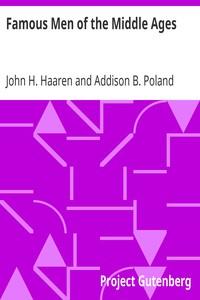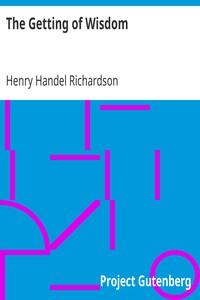Read this ebook for free! No credit card needed, absolutely nothing to pay.
Words: 43808 in 23 pages
This is an ebook sharing website. You can read the uploaded ebooks for free here. No credit cards needed, nothing to pay. If you want to own a digital copy of the ebook, or want to read offline with your favorite ebook-reader, then you can choose to buy and download the ebook.


: Famous Men of the Middle Ages by Haaren John H John Henry Poland Addison B - Europe Biography; Europe History 476-1492 Biographies
Introduction THE GODS OF THE TEUTONS THE NIBELUNGS
INTRODUCTION
THE GODS OF THE TEUTONS
In the little volume called The Famous Men of Rome you have read about the great empire which the Romans established. Now we come to a time when the power of Rome was broken and tribes of barbarians who lived north of the Danube and the Rhine took possession of lands that had been part of the Roman Empire. These tribes were the Goths, Vandals, Huns, Franks and Anglo-Saxons. From them have come the greatest nations of modern times. All except the Huns belonged to the same race and are known as Teutons. They were war-like, savage and cruel. They spoke the same language--though in different dialects--and worshiped the same gods. Like the old Greeks and Romans they had many gods.
Woden, who was also called Odin, was the greatest of all. His name means "mighty warrior," and he was king of all the gods. He rode through the air mounted on Sleip'nir, an eight-footed horse fleeter than the eagle. When the tempest roared the Teutons said it was the snorting of Sleipnir. When their ships came safely into port they said it was Woden's breath that had filled their sails and wafted their vessels over the blue waters.
Thor, a son of Woden, ranked next to him among the gods. He rode through the air in a chariot drawn by goats. The Germans called him Donar and Thunar, words which are like our word thunder. From this we can see that he was the thunder god. In his hand he carried a wonderful hammer which always came back to his hand when he threw it. Its head was so bright that as it flew through the air it made the lightning. When it struck the vast ice mountains they reeled and splintered into fragments, and thus Thor's hammer made thunder.
Another great god of our ancestors was Tiew. He was a son of Woden and was the god of battle. He was armed with a sword which flashed like lightning when he brandished it. A savage chief named Attila routed the armies of the Romans and so terrified all the world that he was called "The Scourge of God." His people believed that he gained his victories because he had the sword of Tiew, which a herdsman chanced to find where the god had allowed it to fall. The Teutons prayed to Tiew when they went into battle.
Frija was the wife of Woden and the queen of the gods. She ruled the bright clouds that gleam in the summer sky, and caused them to pour their showers on meadow and forest and mountain.
Four of the days of the week are named after these gods. Tuesday means the day of Tiew; Wednesday, the day of Woden; Thursday, the day of Thor; and Friday, the day of Frija.
Frija's son was Bald'ur; who was the favorite of all the gods. Only Lo'ki, the spirit of evil, hated him. Baldur's face was as bright as sunshine. His hair gleamed like burnished gold. Wherever he went night was turned into day.
One morning when he looked toward earth from his father Woden's palace black clouds covered the sky, but he saw a splendid rainbow reaching down from the clouds to the earth. Baldur walked upon this rainbow from the home of the gods to the dwellings of men. The rainbow was a bridge upon which the gods used to come to earth.
When Baldur stepped from the rainbow-bridge to the earth he saw a king's daughter so beautiful that he fell in love with her.
Free books android app tbrJar TBR JAR Read Free books online gutenberg
More posts by @FreeBooks

: The House of Heine Brothers in Munich by Trollope Anthony - Short stories; British Germany Fiction; Courtship Fiction


: A Ride Across Palestine by Trollope Anthony - Short stories; Travel Fiction; Disguise Fiction; British Palestine Fiction





